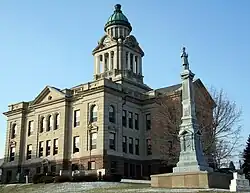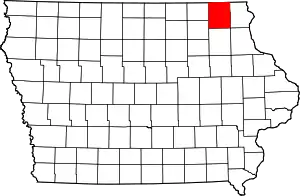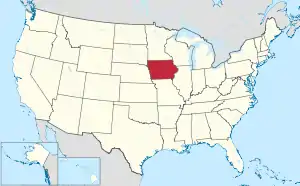Winneshiek County | |
|---|---|
 Courthouse and Civil War Monument located in Decorah | |
 Flag | |
 Location within the U.S. state of Iowa | |
 Iowa's location within the U.S. | |
| Coordinates: 43°17′00″N 91°52′00″W / 43.283333333333°N 91.866666666667°W | |
| Country | |
| State | |
| Founded | 1847 |
| Named for | Chief Winneshiek |
| Seat | Decorah |
| Largest city | Decorah |
| Area | |
| • Total | 690 sq mi (1,800 km2) |
| • Land | 690 sq mi (1,800 km2) |
| • Water | 0.3 sq mi (0.8 km2) 0.04% |
| Population (2020) | |
| • Total | 20,070 |
| • Density | 29/sq mi (11/km2) |
| Time zone | UTC−6 (Central) |
| • Summer (DST) | UTC−5 (CDT) |
| Congressional district | 1st |
| Website | winneshiekcounty |
Winneshiek County is a county located in the U.S. state of Iowa. As of the 2020 census, the population was 20,070.[1] The county seat is Decorah.[2]
History
A largely rural and agricultural county, Winneshiek County has a rich cultural history from Czech, Slovak, English, Irish, German, Swiss, and Norwegian immigrants that have settled within its boundaries.[3]
The county was originally settled in 1848 in present-day Bloomfield Township (near Castalia, Iowa) and in Washington Township (near Fort Atkinson, Iowa). It was organized in 1847, and named after a chief of the Winnebago tribe.
In 1980, Winneshiek County reported a population of 21,842. Like much of Iowa during the 1980s it witnessed a population loss, dropping to 20,847 according to the 1990 United States Census. However, during the 1990s the county experienced some mild growth and was able to rise above the 21,000 mark once again.
Government and elected officials
As of 2010, the Winneshiek County government had a total of 785 employees and staff.
Politics
Like all Iowa counties, Winneshiek is governed by an elected partisan Board of Supervisors. Winneshiek County's Board of Supervisors has five members elected by single-member districts of equal population. Other elected officials are the county attorney, auditor, sheriff and treasurer. The offices for the supervisors and county officers are located in the County Courthouse at the county seat.
Political culture
| Year | Republican | Democratic | Third party | |||
|---|---|---|---|---|---|---|
| No. | % | No. | % | No. | % | |
| 2020 | 6,235 | 51.68% | 5,617 | 46.56% | 212 | 1.76% |
| 2016 | 5,344 | 47.03% | 5,254 | 46.24% | 764 | 6.72% |
| 2012 | 4,622 | 41.70% | 6,256 | 56.44% | 206 | 1.86% |
| 2008 | 4,273 | 37.87% | 6,829 | 60.52% | 182 | 1.61% |
| 2004 | 5,324 | 49.37% | 5,354 | 49.65% | 106 | 0.98% |
| 2000 | 4,647 | 49.35% | 4,339 | 46.08% | 431 | 4.58% |
| 1996 | 3,532 | 40.27% | 4,122 | 47.00% | 1,116 | 12.73% |
| 1992 | 3,331 | 34.61% | 3,791 | 39.39% | 2,502 | 26.00% |
| 1988 | 4,194 | 48.07% | 4,443 | 50.92% | 88 | 1.01% |
| 1984 | 5,277 | 57.96% | 3,724 | 40.90% | 104 | 1.14% |
| 1980 | 5,033 | 54.10% | 3,201 | 34.40% | 1,070 | 11.50% |
| 1976 | 4,765 | 52.08% | 4,158 | 45.45% | 226 | 2.47% |
| 1972 | 5,877 | 56.23% | 4,401 | 42.11% | 174 | 1.66% |
| 1968 | 5,600 | 60.09% | 3,364 | 36.10% | 355 | 3.81% |
| 1964 | 3,941 | 40.38% | 5,811 | 59.55% | 7 | 0.07% |
| 1960 | 5,737 | 54.48% | 4,786 | 45.45% | 7 | 0.07% |
| 1956 | 6,192 | 59.20% | 4,251 | 40.64% | 17 | 0.16% |
| 1952 | 7,154 | 66.64% | 3,560 | 33.16% | 22 | 0.20% |
| 1948 | 4,594 | 47.54% | 4,905 | 50.76% | 164 | 1.70% |
| 1944 | 5,318 | 53.76% | 4,557 | 46.06% | 18 | 0.18% |
| 1940 | 6,208 | 53.35% | 5,405 | 46.45% | 24 | 0.21% |
| 1936 | 4,489 | 40.15% | 5,980 | 53.48% | 712 | 6.37% |
| 1932 | 3,348 | 32.40% | 6,823 | 66.03% | 162 | 1.57% |
| 1928 | 5,084 | 52.46% | 4,535 | 46.79% | 73 | 0.75% |
| 1924 | 4,154 | 43.96% | 1,510 | 15.98% | 3,786 | 40.06% |
| 1920 | 6,684 | 75.98% | 1,933 | 21.97% | 180 | 2.05% |
| 1916 | 2,876 | 57.87% | 1,956 | 39.36% | 138 | 2.78% |
| 1912 | 802 | 15.63% | 2,105 | 41.03% | 2,223 | 43.33% |
| 1908 | 2,767 | 56.79% | 2,008 | 41.22% | 97 | 1.99% |
| 1904 | 3,383 | 68.96% | 1,467 | 29.90% | 56 | 1.14% |
| 1900 | 3,486 | 64.72% | 1,835 | 34.07% | 65 | 1.21% |
| 1896 | 3,422 | 61.75% | 2,033 | 36.68% | 87 | 1.57% |
Geography
According to the U.S. Census Bureau, the county has a total area of 690 square miles (1,800 km2), of which 690 square miles (1,800 km2) is land and 0.3 square miles (0.78 km2) (0.04%) is water.[5]
Major highways
Adjacent counties
- Fillmore County, Minnesota (northwest)
- Houston County, Minnesota (northeast)
- Allamakee County (east)
- Fayette County (south)
- Chickasaw County (southwest)
- Howard County (west)
- Clayton County (southeast)
Demographics
| Census | Pop. | Note | %± |
|---|---|---|---|
| 1850 | 546 | — | |
| 1860 | 13,942 | 2,453.5% | |
| 1870 | 23,570 | 69.1% | |
| 1880 | 23,938 | 1.6% | |
| 1890 | 22,528 | −5.9% | |
| 1900 | 23,731 | 5.3% | |
| 1910 | 21,729 | −8.4% | |
| 1920 | 22,091 | 1.7% | |
| 1930 | 21,630 | −2.1% | |
| 1940 | 22,263 | 2.9% | |
| 1950 | 21,639 | −2.8% | |
| 1960 | 21,651 | 0.1% | |
| 1970 | 21,758 | 0.5% | |
| 1980 | 21,876 | 0.5% | |
| 1990 | 20,847 | −4.7% | |
| 2000 | 21,310 | 2.2% | |
| 2010 | 21,056 | −1.2% | |
| 2020 | 20,070 | −4.7% | |
| U.S. Decennial Census[6] 1790-1960[7] 1900-1990[8] 1990-2000[9] 2010-2018[10] | |||

2020 census
The 2020 census recorded a population of 20,070 in the county, with a population density of 28.878/sq mi (11.1500/km2). 97.20% of the population reported being of one race. There were 8,916 housing units, of which 8,170 were occupied.[1]
| Race | Num. | Perc. |
|---|---|---|
| White (NH) | 18,705 | 93.2% |
| Black or African American (NH) | 119 | 0.6% |
| Native American (NH) | 19 | 0.1% |
| Asian (NH) | 178 | 0.9% |
| Pacific Islander (NH) | 12 | 0.06% |
| Other/Mixed (NH) | 452 | 2.3% |
| Hispanic or Latino | 585 | 3% |
2010 census
The 2010 census recorded a population of 21,056 in the county, with a population density of 30.5332/sq mi (11.7889/km2). There were 8,721 housing units, of which 7,997 were occupied.[12]
2000 census

As of the census[13] of 2000, there were 21,310 people, 7,734 households, and 5,189 families residing in the county. The population density was 31 people per square mile (12 people/km2). There were 8,208 housing units at an average density of 12 per square mile (4.6/km2). The racial makeup of the county was 97.85% White, 0.51% Black or African American, 0.08% Native American, 0.82% Asian, 0.24% from other races, and 0.50% from two or more races. 0.80% of the population were Hispanic or Latino of any race. 38.3% were of German, 31.7% Norwegian, 5.5% Irish and 5.1% Czech ancestry.
There were 7,734 households, out of which 30.9% had children under the age of 18 living with them, 58.9% were married couples living together, 5.5% had a female householder with no husband present, and 32.9% were non-families. 27.6% of all households were made up of individuals, and 12.3% had someone living alone who was 65 years of age or older. The average household size was 2.46 and the average family size was 3.03.
In the county, the population was spread out, with 23.0% under the age of 18, 16.7% from 18 to 24, 24.2% from 25 to 44, 20.4% from 45 to 64, and 15.7% who were 65 years of age or older. The median age was 36 years. For every 100 females there were 96.8 males. For every 100 females age 18 and over, there were 94.3 males.
The median income for a household in the county was $38,908, and the median income for a family was $45,966. Males had a median income of $29,278 versus $21,240 for females. The per capita income for the county was $17,047. About 5.1% of families and 8.0% of the population were below the poverty line, including 6.5% of those under age 18 and 10.5% of those age 65 or over.
Communities
Cities
Census-designated place
Other unincorporated communities
- Bluffton
- Festina
- Frankville
- Highlandville
- Hesper
- Kendalville
Townships
Ghost towns
- Conover
- Moneek
- Sattre
- Canoe
Population ranking
The population ranking of the following table is based on the 2020 census of Winneshiek County.[1]
† county seat
| Rank | City/town/etc. | Municipal type | Population (2020 Census) |
|---|---|---|---|
| 1 | † Decorah | City | 7,587 |
| 2 | Calmar | City | 1,125 |
| 3 | Ossian | City | 802 |
| 4 | Spillville | City | 385 |
| 5 | Fort Atkinson | City | 312 |
| 6 | Ridgeway | City | 275 |
| 7 | Burr Oak | CDP | 171 |
| 8 | Castalia | City | 145 |
| 9 | Jackson Junction | City | 37 |
Education
The following school districts have their administrative headquarters in the county:[14][15]
- Decorah Community School District
- South Winneshiek Community School District
- Turkey Valley Community School District
North Winneshiek Community School District was in the county,[16] until it merged with Decorah CSD on July 1, 2018.[17] The Decorah district and the Mabel-Canton Public Schools in Minnesota have an agreement where people who live in the Decorah district but closer to the Mabel-Canton schools than to Decorah schools can enroll in Mabel-Canton schools.[18]
The following school districts have their administrative headquarters outside of the county but serve sections of Winneshiek County:[14]
See also
References
- 1 2 3 "2020 Census State Redistricting Data". census.gov. United states Census Bureau. Retrieved August 12, 2021.
- ↑ "Find a County". National Association of Counties. Retrieved June 7, 2011.
- ↑ Bailey, Edwin C. (1913). Past and Present of Winneshiek County, Iowa: A Record of Settlement, Organization, Progress and Achievement. Decorah Genealogy Association.
- ↑ Leip, David. "Dave Leip's Atlas of U.S. Presidential Elections". uselectionatlas.org. Retrieved April 28, 2018.
- ↑ "US Gazetteer files: 2010, 2000, and 1990". United States Census Bureau. February 12, 2011. Retrieved April 23, 2011.
- ↑ "U.S. Decennial Census". United States Census Bureau. Retrieved July 20, 2014.
- ↑ "Historical Census Browser". University of Virginia Library. Retrieved July 20, 2014.
- ↑ "Population of Counties by Decennial Census: 1900 to 1990". United States Census Bureau. Retrieved July 20, 2014.
- ↑ "Census 2000 PHC-T-4. Ranking Tables for Counties: 1990 and 2000" (PDF). United States Census Bureau. Archived (PDF) from the original on March 27, 2010. Retrieved July 20, 2014.
- ↑ "State & County QuickFacts". United States Census Bureau. Archived from the original on June 7, 2011. Retrieved July 20, 2014.
- ↑ "P2 HISPANIC OR LATINO, AND NOT HISPANIC OR LATINO BY RACE – 2020: DEC Redistricting Data (PL 94-171) – Winneshiek County, Iowa".
- ↑ "Population & Housing Occupancy Status 2010" (PDF). United States Census Bureau American FactFinder. Archived (PDF) from the original on October 16, 2020. Retrieved August 15, 2022.
- ↑ "U.S. Census website". United States Census Bureau. Retrieved January 31, 2008.
- 1 2 "Comprehensive Plan" (PDF). Winneshiek County. December 2016. p. 90. Archived (PDF) from the original on April 6, 2020. Retrieved April 6, 2020. - (PDF p. 91/512) See "Figure 8: School Districts in Winneshiek County" in section "Public Schools"
- ↑ "2020 CENSUS - SCHOOL DISTRICT REFERENCE MAP: Winneshiek County, IA" (PDF). U.S. Census Bureau. Archived (PDF) from the original on July 20, 2022. Retrieved July 19, 2022. - Text list
- ↑ "SCHOOL DISTRICT REFERENCE MAP (2010 CENSUS): Winneshiek County, IA" (PDF). U.S. Census Bureau. Retrieved July 19, 2022. - Text list
- ↑ "Iowa Educational Directory 2019-2020 School Year" (PDF). Iowa Department of Education. p. 175. Archived from the original (PDF) on April 5, 2020. Retrieved April 5, 2020. (PDF p. 177/186) - From section "REORGANIZATION & DISSOLUTION ACTIONS SINCE 1965-66"
- ↑ "Mabel-Canton, Decorah sign enrollment agreement for students on the border". Bluff Country Newspaper Group. February 8, 2019. Retrieved April 6, 2020.
External links
- Winneshiek County - Official County Government site
- Winneshiek County Health and Demographic Data
- 1913 History of Winneshiek County
- Official Winneshiek County Fair site